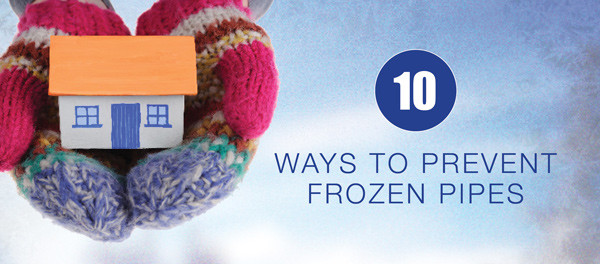For the most part, the temperatures have been fairly mild as we gear up for colder temperatures in New Mexico. With mild temperatures dominating our days, we may not be prepared if the temperature starts to drop. However, Santa Fe residents know that once the temperature drops you’ve got to be prepared to prevent frozen pipes. Unlike Albuquerque where residents may occasionally experience freezing temperatures, Santa Fe’s higher elevation winter temps routinely fall into the freezing temperature range. It is important to know what you can do to prevent frozen pipes in your home. Below are some tips from our plumbing pros to help prevent this situation from happening to you.
When water freezes, it expands, causing stress and strain on your pipes. If the integrity of your plumbing is compromised, that could mean cracks, leaks, or worse – burst pipes. Make sure you’re prepared for freezing temps this year.
1. Watch the Weather.
While water can freeze at 32°F, but the water in pipes has a lower threshold. If you’re inching towards 20°F, it’s time to worry about bursting.
2. Drip, Drip, Drip.
Contrary to popular belief, leaving the faucet dripping does not actually stop the water from freezing. But, it can stop a pipe from bursting. Turning on your faucet opens a valve that relieves the water pressure that would normally pressure a pipe to burst. It doesn’t have to be much, even the slowest drip will relieve the pressure!
3. Keep Your Pipes Warm.
Subfreezing temps are unpleasant for almost everything, including your pipes. If it’s going to be a cold night and you have plumbing exposed to the elements, you may want to insulate them. You can use more than just a t-shirt to wrap your pipes! Options include pipe sleeves, heat tape, heat reflector lamps, and actual cables that wrap around pipes to heat them in the winter.
4. Seal the Outside of Your Home.
Checking your space for air leaks and cracks is also a great way to boost heating efficiency in the winter. Seal with caulk or insulation.
5. Know Your System.
Every home plumbing system is different. Do you have pipes in an attic? Does your home have a crawl space? You may need to take extra precautions to insulate your pipes from the cold.
6. Let Warm Air In.
On cold nights open up the cabinet doors under your sinks to all the warm air in your home to circulate under the sink.
7. Disconnect the Garden Hose.
Don’t risk the integrity of your outdoor valves! Disconnect before freezing weather arrives and install a Styrofoam faucet cover to protect it from freezing temperatures. These are available at most home improvement stores.
8. Traveling for the Holidays?
Avoid frozen pipes by shutting off and draining the water in the pipes, before you leave.
9. Locate Your Shutoff Valve.
Knowing where your main water shutoff valve is crucial, especially in the wintertime. If you experience burst pipes, shutoff the water immediately.
10. Monitor Water Pressure.
Inconsistent water pressure can be a sign of an existing plumbing problem and might mean that your pipes are more at risk to have freezing problems. Keep an eye on your water pressure to ensure that your pipes are well-protected.
When frozen pipes burst, there is a splashing, hissing, or a thumping noise. There may be an accompanying odor caused by the water damage in a strange area of your home’s structure.
If you wake up after a cold night and nothing is coming out of your faucet, it’s important to call a professional plumber or (505) 955-4333 for the City Water Department if your pipes are frozen, leaking or burst.

